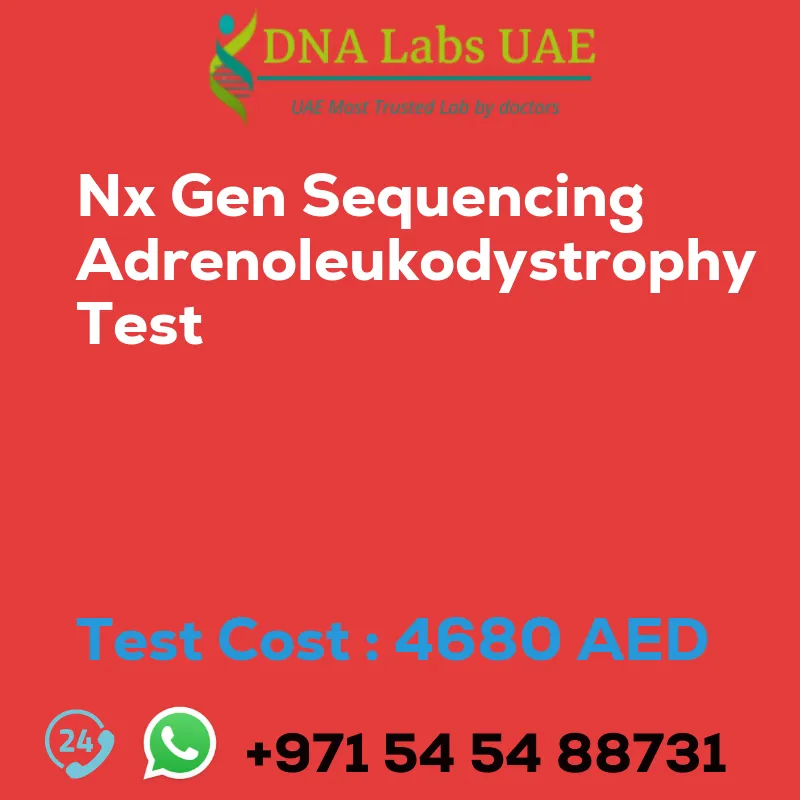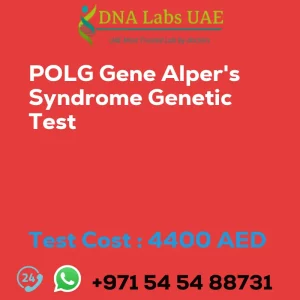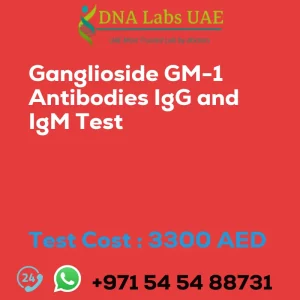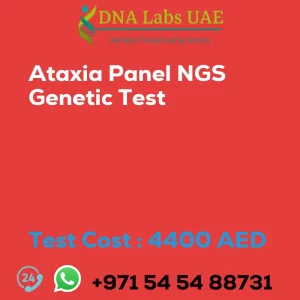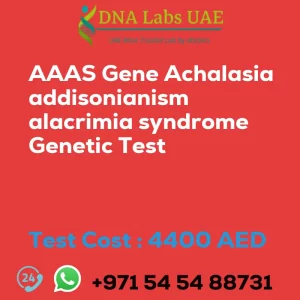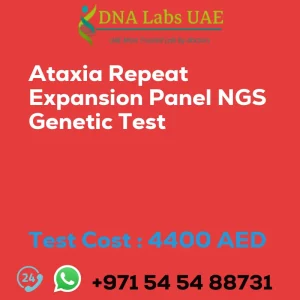Nx GEN SEQUENCING ADRENOLEUKODYSTROPHY Test
Cost: AED 4680.0
Symptoms, Diagnosis, and Test Details
Adrenoleukodystrophy (ALD) is a genetic disorder that affects the nervous system and adrenal glands. It is caused by mutations in the ABCD1 gene, which leads to the buildup of very long-chain fatty acids (VLCFAs) in the body.
Next-generation sequencing (NGS) can be used to test for mutations in the ABCD1 gene and diagnose ALD. NGS is a high-throughput sequencing method that allows for the simultaneous sequencing of many DNA fragments. It can detect various types of genetic alterations, including point mutations, insertions, deletions, and gene rearrangements.
To perform an ALD test using NGS, a blood or saliva sample is collected from the patient. The DNA is then extracted from the sample and prepared for sequencing. The DNA is fragmented into smaller pieces and adapters are added to the ends of the fragments. These adapters contain specific sequences that allow the fragments to bind to a sequencing flow cell.
The prepared DNA is then loaded onto a next-generation sequencing platform, such as Illumina or Ion Torrent. The platform uses different sequencing chemistries and technologies to read the DNA sequences of the fragments. The resulting raw sequencing data is processed and analyzed using specialized bioinformatics tools.
In the case of ALD testing, the bioinformatics analysis focuses on identifying mutations in the ABCD1 gene. The sequenced DNA fragments are aligned to a reference genome, and any differences or variations are identified. The data is then analyzed to determine if any of these variations are pathogenic mutations associated with ALD.
The results of the ALD test using NGS will indicate whether the patient has any mutations in the ABCD1 gene that are known to cause ALD. This information can be used for diagnosis, genetic counseling, and potentially for treatment decisions.
It is important to note that NGS-based ALD testing may not detect all possible mutations in the ABCD1 gene, as there may be rare or novel mutations that are not included in the reference databases. Therefore, it is recommended to confirm the diagnosis with additional testing, such as Sanger sequencing or targeted gene panels, if necessary.
Test Components
- ABCD1
Price
AED 4680.0
Sample Condition
Submit 10 mL (5 mL min.) whole blood from 2 Lavender Top (EDTA) tubes. Ship refrigerated. DO NOT FREEZE. Duly filled Whole Exome Sequencing Consent Form (Form 37) is mandatory.
Report Delivery
Sample Daily by 9 am; Report 40 Working days
Method
NGS, Sanger sequencing
Test Type
Paralysis
Doctor
Neurologist
Test Department
MOLECULAR DIAGNOSTICS
Pre Test Information
Duly filled Whole Exome Sequencing Consent Form (Form 37) is mandatory.
| Test Name | Nx GEN SEQUENCING ADRENOLEUKODYSTROPHY Test |
|---|---|
| Components | *ABCD1 |
| Price | 4680.0 AED |
| Sample Condition | Submit 10 mL (5 mL min.) whole blood from 2 Lavender Top (EDTA) tubes. Ship refrigerated. DO NOT FREEZE. Duly filled Whole Exome Sequencing Consent Form (Form 37) is mandatory. |
| Report Delivery | Sample Daily by 9 am; Report 40 Working days |
| Method | NGS, Sanger sequencing |
| Test type | Paralysis |
| Doctor | Neurologist |
| Test Department: | MOLECULAR DIAGNOSTICS |
| Pre Test Information | Duly filled Whole Exome Sequencing Consent Form (Form 37) is mandatory. |
| Test Details |
Adrenoleukodystrophy (ALD) is a genetic disorder that affects the nervous system and adrenal glands. It is caused by mutations in the ABCD1 gene, which leads to the buildup of very long-chain fatty acids (VLCFAs) in the body. Next-generation sequencing (NGS) can be used to test for mutations in the ABCD1 gene and diagnose ALD. NGS is a high-throughput sequencing method that allows for the simultaneous sequencing of many DNA fragments. It can detect various types of genetic alterations, including point mutations, insertions, deletions, and gene rearrangements. To perform an ALD test using NGS, a blood or saliva sample is collected from the patient. The DNA is then extracted from the sample and prepared for sequencing. The DNA is fragmented into smaller pieces and adapters are added to the ends of the fragments. These adapters contain specific sequences that allow the fragments to bind to a sequencing flow cell. The prepared DNA is then loaded onto a next-generation sequencing platform, such as Illumina or Ion Torrent. The platform uses different sequencing chemistries and technologies to read the DNA sequences of the fragments. The resulting raw sequencing data is processed and analyzed using specialized bioinformatics tools. In the case of ALD testing, the bioinformatics analysis focuses on identifying mutations in the ABCD1 gene. The sequenced DNA fragments are aligned to a reference genome, and any differences or variations are identified. The data is then analyzed to determine if any of these variations are pathogenic mutations associated with ALD. The results of the ALD test using NGS will indicate whether the patient has any mutations in the ABCD1 gene that are known to cause ALD. This information can be used for diagnosis, genetic counseling, and potentially for treatment decisions. It is important to note that NGS-based ALD testing may not detect all possible mutations in the ABCD1 gene, as there may be rare or novel mutations that are not included in the reference databases. Therefore, it is recommended to confirm the diagnosis with additional testing, such as Sanger sequencing or targeted gene panels, if necessary. |

